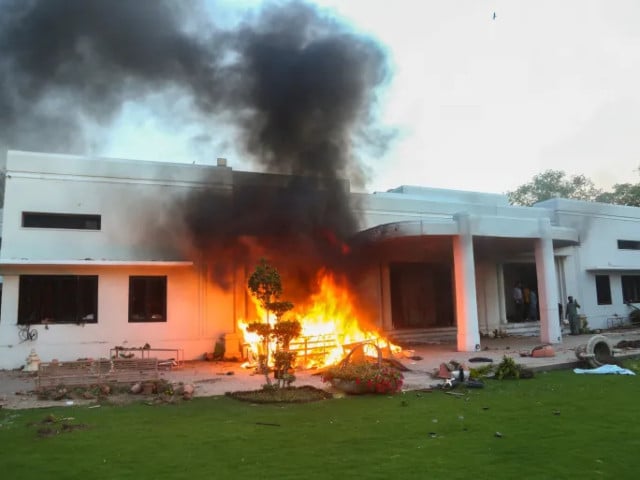
An anti-terrorism court (ATC) in Lahore on Thursday ordered the Camp Jail superintendent to hand over 16 people, including a former PTI MPA, accused of attacking the Lahore corps commander’s residence – also known as Jinnah House – during the May 9 protests to the army to initiate trials against them in the military courts.
ATC Judge Abher Gul Khan passed the order while allowing an application filed by a commanding officer for the custody of the suspects.
“According to the initial investigation, the following accused persons are prime facie found involved with the commission of offences under the provisions of Official Secrets Act, 1923 read with Section 2(1)(d) and 59(4) of the Pakistan Army Act 1952,” the application stated which contained a list of 16 suspects.
The Army Act of 1952 established military courts primarily to try members of the military or enemies of the state. Civilians can only be tried there under a federal government order. Civilians accused of offences such as waging war against the armed forces or law enforcement agencies, or attacking military installations or inciting mutiny, can be tried in military courts.
On May 9, in an unprecedented show of vandalism, protestors allegedly belonging to the PTI, vandalised public and state properties and even attacked the General Headquarters in Rawalpindi and the Lahore corps commander’s residence.
The attack occurred hours after the paramilitary Rangers arrested PTI chief Imran Khan in the Al-Qadir Trust corruption case – later retitled as National Crime Agency £190 million scandal – on the orders of the National Accountability Bureau, from the Islamabad High Court premises.
The rioting was followed by a harsh crackdown against the former ruling party leaders and workers that still continues.
The army had termed the events of May 9 a “dark chapter” and announced its intent to try the protesters under relevant laws, including two military laws — the Pakistan Army Act and Official Secrets Act.
The decision was backed by the National Security Committee (NSC) – the country’s top security panel. It was approved by the federal cabinet wherein it was decided that the protesters who ransacked and vandalised military installations on May 9 would be tried under the Army Act and the Official Secrets Act.
The decision was widely condemned by local and international rights organisations, including from within the ruling coalition, warning that the move was against democratic principles.
The Amnesty International also expressed its concerns over the decision to try May 9 rioters under the Army Act, saying: “Using military courts to try civilians is a clear violation of international law.”
Read Government adamant on cornering Imran Khan
On Monday, the PTI moved the Supreme Court against trying civilians in military courts, calling the decision a "clear violation" of the constitutional guarantees of due process and fair trial.
"Such trials are highly deprecated internationally and widely considered as falling short of providing fair trial," the petition stated.
On Thursday, the commanding officer submitted that Sarwar Road police and Race Course police had registered two cases – damaging public and private properties, including Jinnah House – against the accused and that they had been sent to jail on judicial remand by the court.
He submitted that the accused were guilty of offences under sections 3, 7 and 9 of the Official Secrets Act, 1923, and Section 2(1)(d) and 59 (4) of the Pakistan Army Act, 1952.
He maintained that the accused were exclusively triable by the military courts, pleading the court to hand them over for further proceedings in accordance with the law.
Section 2(1)(d) of the Army Act elaborates on persons subject to the act and Section 59(4) states: “Notwithstanding anything contained in this Act or in any other law for the time being in force a person who becomes subject to this Act by reason of his being accused of an offence mentioned in clause (d) of subsection (1) of Section 2 shall be liable to be tried or otherwise dealt with under this Act for such offence as if the offence were an offence against this Act and were committed at a time when such person was subject to this Act; and the provisions of this section shall have effect accordingly.”
As per the court's verdict, the prosecution did not oppose the commander's request, and subsequently, the court ordered Camp Jail superintendent to hand over all the 16 accused to the officer.
“In view of the request made by Irfan Akhtar, commanding officer/military officer, duly forwarded by the prosecution as the case of above mentioned accused is exclusively triable by military court, therefore, while accepting the request of commanding officer u/s 549(3) of the CrPC, read with Rule 7(f) of the Criminal Procedure (Military Offenders) Rules, 1970, superintendent, Jail Canmp, Lahore is directed to hand over the custody of the above said accused to the commanding officer for further proceedings in accordance with the law,” the court ruled.
Former PTI MPA Mian Akram Usman had also been named as one of the suspects.
According to sources, the accused include Ammar Zohaib, Ali Iftikhar, Ali Raza, Muhammad Arsalan, Muhammad Umair, Muhammad Rahim, Ziaur Rehman, Waqas Ali, Rais Ahmed, Faisal Arshad, Muhammad Bilal, Faheem Haider, Arzam Junaid, Mian Muhammad Akram Usman, Muhammad Hasher Khan and Hassan Shakir.

1725354252-0/Untitled-design-(5)1725354252-0-405x300.webp)
1732099866-0/adele-(3)1732099866-0-165x106.webp)





1721801554-0/BeFunky-collage]-(10)1721801554-0-270x192.webp)

1732099821-0/BeFunk_§_]__-(14)1732099821-0.jpg)







COMMENTS (5)
Comments are moderated and generally will be posted if they are on-topic and not abusive.
For more information, please see our Comments FAQ